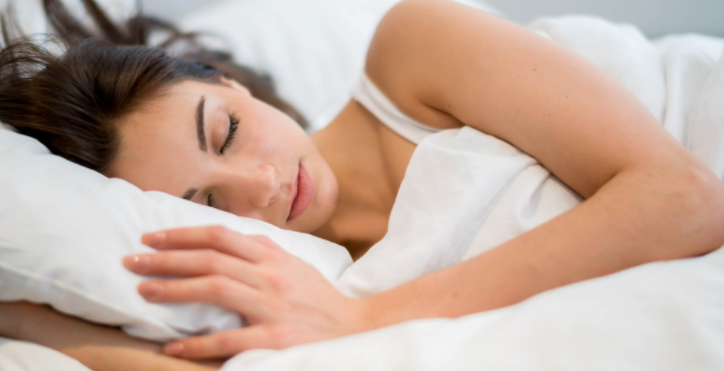-
What happens to your skin if don't get enough sleep
It's easy to fall into a pattern of getting less and less sleep. A late night job here, dinner with friends there, and suddenly you're averaging far below the National Sleep Foundation -recommended seven to nine hours of rest each night.
It may not seem like a big deal, but getting less than seven hours of sleep can wreak havoc on your mental and physical health. And there is one of the more visible side effects of sleep deprivation. Premature aging of the skin.
Yes, my restless friend, beauty sleep is real and you need a lot of it. So we went to the experts - Jeannel Astarita, esthetician and founder of Ageless Beauty Body Sculpting + Beauty Lab, and triple board-certified dermatopathologist and CEO of Gretchen Frieling, MD GFaceMD - Analyzes why sleep is essential to maintaining healthy skin and what to do if you can't get enough Zzz's every night.
Is skin beauty sleep really that important?
During sleep is when the body rests and regenerates by removing and replacing dead cells in the skin and blood cells, says Astarita. More sleep also lowers levels of the stress hormone cortisol , which causes free radical damage to the skin and other systems in the body.
Dr. Freeling adds that getting enough sleep has dozens of anti-aging effects on the skin , including natural sleep-induced collagen production, which prevents sagging skin and wrinkles. So, over time, consistent sleep deprivation can cause a more rapid depletion of skin elasticity and plumpness. And in the short term, as anyone who has had a rough night knows, Dr. Freeling says that lack of sleep can definitely cause puffiness and swelling of the eyes the dreaded dark circles .
What happens to your skin when you don't get enough sleep?
First, there are the obvious things. As Dr. Freiling says, short sleep not only makes your body tired, but it also disrupts your general sleep cycle, and the effects can be seen on your face.
Skin imbalance, she says, can lead to dehydration, dull skin, acne and redness. Less sleep affects the skin's pH levels. It lowers moisture levels and uses up your natural glow.
And, says Astarita, lack of sleep also means that cells damaged by sun exposure or scars don't have enough time to regenerate. This means you're more likely to notice fine lines and discoloration in the morning. This is a good thing.
Sleepless nights cannot be avoided completely. So what is the best way to deal with it?
If you happen to have a late, restless night, don't be surprised. Astarita says it's easy to course-correct that behavior and help your skin Drink plenty of water to help plump up your cells in the morning. You can also put a few spoons in the freezer and place them over your eyes to reduce dark circles and dark circles under the eyes, she adds.
Unfortunately, pulling an all-nighter here and there is a young adult game, says Dr. Freeling. As with anything, aging makes skin less resilient to sleep deprivation. The younger you are, the faster you bounce back from everything, she says. The skin of a 20-year-old is less likely to show the effects of an all-nighter as dramatically as the skin of a 40-year-old.
Late nights with caffeine or alcohol can make skin rashes even worse. If the all-nighter includes caffeine or alcohol, the skin may become even more dehydrated. When alcohol is consumed (especially heavy drinking), the skin becomes puffy and red, explains Dr. Freeling. If you keep eating salty foods like peanuts and pretzels, you can expect to wake up with a bloated face.
While staying up late won't make you age overnight, Dr. Freeling recommends doing so as healthily as possible to hydrate with water, eat foods low in sodium, consume protein, and take off makeup to allow your skin to recover. Moisturize for 24 hours and keep alcohol consumption below two drinks.
The best products to care skin damage caused by lack of sleep
Fortunately, there are a few products that can help combat all the skin effects of insomnia. Astarita says that using a retinol product before bedtime is one of the best things you can do for your skin.
I love AlphaRet Overnight Cream from SkinBetter Science, she says. It combines the benefits of retinoids and alpha hydroxy acids to brighten and target fine lines without irritating them like some retinol products do.
Her other favorites are: Biosance Squalane Vitamin C Rose Oil, which helps brighten and tighten the skin, and Defenage 8-in-1 Bioserum , a peptide product that triggers your skin to make new cells.
Dr. Freeling recommends Dermalogica Overnight Repair Serum, which is also supercharged with peptides to firm and renew, and Rodial Super Acid X-treme Hangover Mask, a triple-action product made with resurfacing clay. Lastly, she says, Laneige Water Sleeping Mask . This is perfect for dehydrated skin that craves moisture, she says. Formulated with a high concentration of hydro-ionized mineral water, it delivers powerful moisture to stressed, dry skin.
But as both experts point out, don't rely on beauty products alone; head to bed instead.

